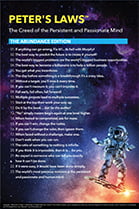
“To win in the marketplace, you must first win in the workplace.” –Doug Conant, CEO, Campbell Soup Company
A company's culture and core values are the bedrock of innovation and effective teams.
Today, most successful companies, the ones that are “crushing it,” don’t just have great technology but are also deeply focused on culture.
If you want to create a successful, hyper-growth company, you've got to focus on empowering your teams to take risk and not fear failure.
Through my conversations with executives at Google and my own companies, I have compiled a suite of best practices for you to use when building your own highly effective teams.
Let’s dive in.
P.S. Send any tips to our team by clicking here, and send your friends and family to this link to subscribe to Abundance Insider.
Google’s 5 Keys to an Effective Team
Back in 2013, Google’s People Operations Group conducted a rigorous analysis deemed Project Aristotle to identify what underlying factors led to the most effective Google teams.
Over 200 interviews were conducted across +180 active Google teams over the course of the two-year study.
More than 250 attributes were identified that contributed to both success and failure.
Their hypotheses was that they would find the perfect mix of individual traits and skills necessary for a stellar team -- take one Rhodes Scholar, two extroverts, one engineer who rocks at Python, and a quantum physics Ph.D. Voila. Dream team assembled, right?
Turns out they were dead wrong.
The researchers found that what really mattered was less about who is on the team, and more about how the team worked together.
Here are the top five keys to an effective Google team, in order of importance:
1. Psychological safety: Psychological safety refers to an individual’s perception of the consequences of taking an interpersonal risk or a belief that a team is safe for risk-taking in the face of being seen as ignorant, incompetent, negative or disruptive. In a team with high psychological safety, teammates feel safe to take risks around their team members. They feel confident that no one on the team will embarrass or punish anyone else for admitting a mistake, asking a question or offering a new idea.
2. Dependability: On dependable teams, members reliably complete quality work on time (vs. the opposite -- shirking responsibilities).
3. Structure and clarity: An individual’s understanding of job expectations, the process for fulfilling these expectations, and the consequences of one’s performance are important for team effectiveness. Goals can be set at the individual or group level, and must be specific, challenging and attainable. Google often uses Objectives and Key Results (OKRs) to help set and communicate short- and long-term goals.
4. Meaning: Finding a sense of purpose in either the work itself or the output is important for team effectiveness. The meaning of work is personal and can vary: financial security, supporting family, helping the team succeed, or self-expression for each individual, for example.
5. Impact: The results of one’s work, the subjective judgement that your work is making a difference, is important for teams. Seeing that one’s work is contributing to the organization’s goals can help reveal impact. Think about your Massively Transformative Purpose here as a North Star here, inspiring and uniting your team around a common goal.
PHD Ventures Core Values
I have an extraordinary team of millennials who work with me across everything I do.
We take our culture extremely seriously and have built out a set of core values that guide the way we work and communicate.
I believe it is fundamentally important to build core values for your own teams as they act as the glue that binds everyone together.
Here are our nine core values:
1. “Yes and” Mindset for Team, Clients and Community: Innovative teams all know how to collaborate and maximize the present moment. “Yes” means accepting whatever information is given to you. “And” is how you respond to the idea and build onto it.
2. Moonshot Thinking - No Quick Hits: Instead of a mere 10% gain, moonshot thinking aims for a 10x improvement over what currently exists. Challenge your team to take exponential leaps, not incremental improvements.
3. Courageous Persistence: The world’s most precious resource is the passionate and persistent human mind. Get your team to embrace long-term thinking.
4. Relentlessly Proactive & Resourceful: The self-directed employee takes responsibility for her own decisions and actions. Having a team that can constantly say “We can figure it out” creates a competitive edge.
5. Encourage, Inspire and Support Ambition and Big Thinking: Individuals on the team must be motivated by the collective team's success as well as their own. Build an incentive structure that allows for that.
6. Dedication to Excellence: Perfection is not optional. The enemy of great is good. Always strive for the best possible product, service or experience.
7. Trust Each Other to Execute: In a decentralized team working remotely, this core value is extremely important. Always trust your teammates are doing their best work with good intentions. Don’t jump to conclusions or judgements.
8. Total Ownership & Dedication to Continuous Improvement: Every member of the team needs to embody a growth mindset: the belief that they can learn more or become smarter if they work hard and persevere.
9. Experiment, Listen to the Data, and Focus on the Customer: Experimentation is a crucial mechanism for driving breakthroughs in any organization. If you want to create a successful, hyper-growth company, you've got to focus on empowering your teams to rapidly experiment.
Also read: TOP 50 MOON SHOTS (2000 - 2020)
WHAT IS ABUNDANCE INSIDER?
This email is a briefing of the week's most compelling, abundance-enabling tech developments, curated by Marissa Brassfield in preparation for Abundance 360. Read more about A360 below.
WANT MORE CONVERSATIONS LIKE THIS? - JOIN ME
At Abundance 360, Peter's 360-person executive mastermind, we teach the metatrends, implications and unfair advantages for entrepreneurs enabled by breakthroughs like those featured above. We're looking for CEOs and entrepreneurs who want to change the world. The program is highly selective. Apply now for Abundance360 Summit if you'd like to develop an Abundance mindset.
Know someone who would benefit from getting Abundance Insider? Send them to this link to sign up.
P.S. I've just released a podcast with my dear friend Dan Sullivan called Exponential Wisdom. Our conversations focus on the exponential technologies creating abundance, the human-technology collaboration, and entrepreneurship. Head here to listen and subscribe.







